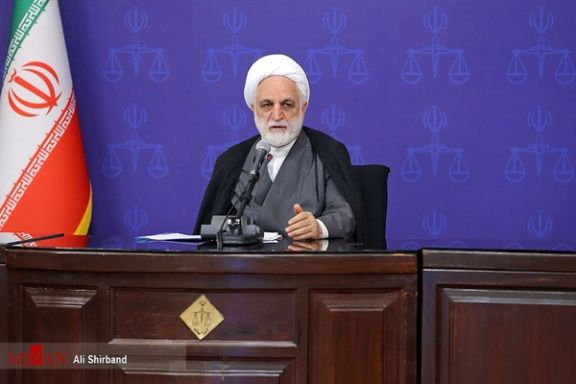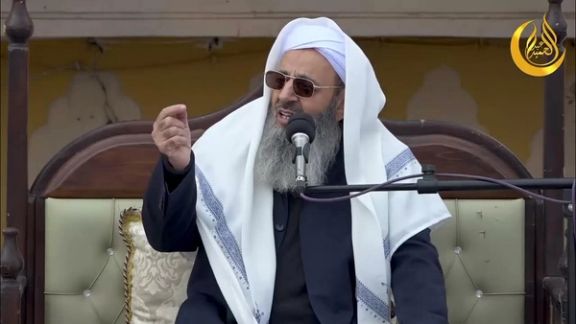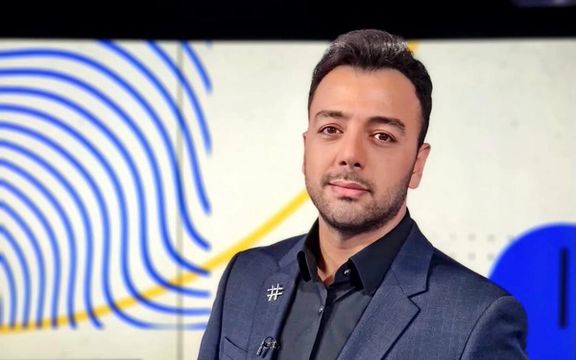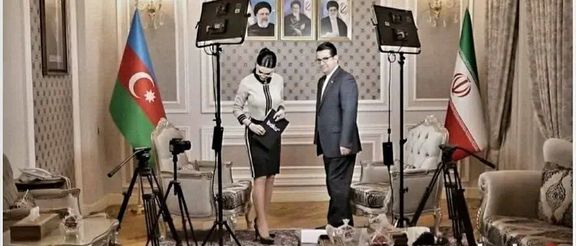Corruption Plagues Iran As Judiciary Acknowledges Public Outcry

Amidst a backdrop of escalating corruption scandals and economic turmoil, the head of Iran's judiciary has acknowledged the public's discontent over injustice.

Amidst a backdrop of escalating corruption scandals and economic turmoil, the head of Iran's judiciary has acknowledged the public's discontent over injustice.
Gholamhossein Mohseni Ejei’s statement on Saturday came in the wake of widespread outrage fueled by recent revelations, including a land-grab involving Tehran's Friday prayer Imam Kazem Sedighi.
In recent years, Iran has been rocked by a series of corruption scandals and economic setbacks, exacerbating the already challenging conditions facing its citizens. Corruption has permeated various sectors, ranging from government officials to influential religious figures.
A focal point of controversy centers on Kazem Sedighi, the Friday prayer leader in Tehran. Sedighi, known for his ultra-conservative stances, faces accusations of unlawfully acquiring land valued at $20 million.
Documents disclosed by a whistleblower indicate that Sedighi and his children acquired a 45,200 square foot garden situated in a prime location in northern Tehran.
Against the backdrop, Ejei acknowledged the widespread corruption saying, "I am the foremost responsible official to express these words. If I fell short in any way, I am to blame; I couldn't secure your rights from usurpers."
The judiciary's acknowledgment of public discontent signals a recognition of the severity of the situation.
Despite widespread public outrage, the Iranian judiciary has refrained from pursuing legal action against Sedighi. The leniency has prompted many Iranians on social media to draw comparisons between the treatment afforded to Sedighi, who finally expressed sorrow Friday night accepting the allegations, and the regime's severe punishments for citizens accused of minor offenses.

The stabbing of an exiled Iranian TV presenter in London has renewed calls for action to confront and deter the regime in Tehran from expanding its malign activities.
Pouria Zeraati, a journalist and host at the UK-based Iran International, was attacked outside his home in Wimbledon Friday afternoon, reportedly by a few men who fled in a car after knifing him.
It is still unclear who the attackers were and what their motive was. But fingers were pointed at the Iranian regime almost immediately after the news broke, given the Islamic Republic’s track record in plotting against dissidents –and even foreign officials.
“The long arms of the brutal Iranian regime,” commented Hannah Neumann, a Green member of the European parliament. “We all need to urgently do our homework to protect those who seek refuge here from transnational threats and violence.
This is not the first time the Iranian regime seeks to harm Iran International journalists. An ITV investigation last year revealed that Iran’s Revolutionary Guards (IRGC) had commissioned a hitman to assassinate the hosts of two flagship shows on Iran International TV. The plot unraveled because the hitman turned out to be an agent of a ‘western intelligence agency’.
This time they got much closer, stabbing and injuring another Iran International journalist.
“Thankfully his condition is not believed to be life-threatening and he is in a stable condition,” London Metropolitan police announced in a statement. “However, due to the victim’s occupation…coupled with the fact that there has been a number of threats directed towards this group of journalists in recent times, the incident is being investigated by specialist officers from the Met’s Counter Terrorism Command.”
According to the police, since 2022, a number of plots to kidnap or kill UK-based individuals perceived as enemies of the Iranian regime have been disrupted.
British MP and Chair of Foreign Affairs Committee Alicia Kearns said, "Iran continues to hunt down those brave enough to speak out against the regime. Yet I remain unconvinced that we and our allies have clear strategies to protect people in our countries from them, and protect our interests abroad."
Critics like Kearns believe inaction or confusion in dealing with Iran’s threats has emboldened the Iranian regime to attempt to silence dissidents anywhere in the world with almost absolute impunity.
“The Islamic Republic feels safe in attacking journalists like Pouria Zeraati because it knows that it won’t face any consequences,” wrote Alireza Nader, an expert on Iran and US policy. “The Biden admin has no Iran policy, just a vague hope that it can return to “diplomacy” with the regime. And Europe follows Biden’s lead. How many more people will be knifed before @POTUS changes his policy?”
In February 2023, Iran International was forced to temporarily shut down operations in London and move to Washington, as threats against the organization and its employees were deemed too dangerous and imminent.
Not long before the incident, Iran's minister of intelligence had called Iran International a terrorist organization, laying the grounds for all sorts of action against the broadcaster and its journalists.
“I appreciate the wider concern this incident may cause,” said Commander Dominic Murphy, head of the Met’s Counter Terrorism, “particularly amongst others in similar lines of work, and those from Iranian communities. We continue to work closely with the victim’s organization.”
“This is a wakeup call for US and European officials,” Karim Sadjadpoor of Carnegie Endowment for Peace said on X. “Iran is actively trying to kill reporters and activists in the West and nearly succeeded in the middle of London.”

An Iranian-Swedish citizen says he has been threatened by the Iranian authorities’ security forces over his involvement in anti-regime protests.
Saman Taherpour says that the threat, received in a phone call two weeks ago, came from an Iranian official who urged him to end his activism in support of the Women, Life, Freedom protests.
These protests, unprecedented and nationwide, erupted in Iran in September 2022 following the death of Mahsa Jina Amini, who died in the custody of the regime’s so-called morality police for not wearing her hijab properly.
In the 17-minute-long phone call, excerpts of which have been disclosed, the security agent further alleges Taherpour's involvement in "leading" anti-regime protests in Sweden, accusing him of committing crimes “against Iran's national security”.
Prior to this call, Iranian officials reportedly also reached out to Taherpour's family in Iran and his next of kin in Sweden – informing them of alleged ongoing investigations against him.
Taherpour is the founder of Kiani Concept, a Sweden-based brand specializing in products like clothing, jewelry, and ornaments.
“We spoke to your father. The government’s position is that Iranians abroad should be treated with more tolerance but only if they express remorse and continue their activities within the framework that we set,” the security agent told Taherpour, further warning him that his actions in Sweden are being monitored.
Encountering Taherpour’s resistance and his expressed commitment to keep working against the regime, the agent threatened that he will come after Taherpour in Sweden and that “they will meet soon.”
When Taherpour resisted and declared his steadfast commitment to continue his activism against the regime, the agent issued a threat – stating his intention to come after Taherpour in Sweden, declaring that "they will meet soon."
In an interview with Iran International, Taherpour said the callers made it very clear to him that the Iranian regime has "forces" in Sweden, capable of exerting pressure or taking action against him.
According to Taherpour, the regime’s security agents were aware of the details of his whereabouts and those of his family members and close friends in Sweden.
After the threatening phone call, Taherpour contacted Sweden’s Security Service (SÄPO), which then launched a probe into the incident and asked him to adopt certain security measures.
SÄPO also told Taherpour that such threats are a frequent occurrence for Iranians living in Sweden.
According to reports, Iran’s security agencies have called a large number of Iranian residents in Sweden and threatened them not to participate in protests against the regime. In February, SÄPO maintained that Iran, Russia and China pose the largest security threats to Sweden.
This is not the first time Iranian citizens or dual-nationals in the Iranian diaspora have been threatened or attacked by purported security agencies of the regime in Tehran.
In February 2023, Guardian reported, via personal accounts from the Iranian diaspora, that the regime appears to be behind “a Europe-wide campaign of harassment, surveillance, kidnap plots and death threats” to target foreign-based political dissidents.
In January 2023, an audio file shared on social media revealed that an Iranian security agent, who introduced himself as an agent of the intelligence ministry, threatened "Massi Kamri”, an Iranian activist living in France – tell her that if she does not stop acting against the regime, they will imprison her parents and family members in Iran.
Using an insulting tone, the agent tells Kamri if she cares about her family and does not want them to be taken to the notorious Evin prison in Tehran, she should not engage in anti-Islamic Republic activities.
In December 2023, UK’s ITV revealed that the IRGC was plotting to assassinate two Iran International television anchors in London in 2022 amid Iranian anti-government protests.

In an explicit reference to the Iranian regime’s continued crackdown, Iran’s top Sunni cleric Mowlavi Abdolhamid warned no government will be able to ensure its survival by use of force.
“Governments cannot be maintained by weapons…All the systems in the world need the support of the people to survive,” said the top religious leader of Iran’s largely Sunni Baluch (Baloch) population in his Friday prayer sermons in Zahedan, the provincial capital of Sistan-Baluchestan.
His remarks come against the backdrop of Tehran’s severe crackdown on dissidents and protesters, including ethnic and religious minorities. Human Rights Activists in Iran (HRA) reported that 324 people were arrested in 2023 over their ethnic activism, 19 of whom were given 984 months of imprisonment by Iran's judiciary.
In his sermon, Abdolhamid also discussed Iran’s worsening economic crisis, further adding that conditions will not improve if there is no political stability in the country.
“The economy has been hit so hard that we sleep at night and we wake up in the morning only to find that the value of the national currency has dropped,” he pointed out.
In more than a decade, the country's economic growth has averaged zero. The situation has been further exacerbated since the US withdrawal from the JCPOA nuclear deal in 2018. Over the past six years, the rial, Iran’s national currency, has fallen 15-fold, fueling inflation and plunging millions of citizens into poverty.
As on previous Fridays, Iran’s security forces patrolled around the Makki Jameh Mosque of Zahedan, where Abdolhamid delivers his critical sermons on a weekly basis, reports from Zahedan said.

Pouria Zeraati, the television host of the "Last Word" program on Iran International, was attacked by a group of unidentified individuals as he exited his residence in London on Friday.
Zeraati, who was attacked in the early afternoon in south London, suffered knife wounds. He is in a stable condition, but remains hospitalized. The Metropolitan Police in London are conducting an investigation into the incident.
While the motive is unclear, the attack comes just a few months after a plot by the Iranian regime to kill 2 other Iran International journalists was revealed.
The Metropolitan Police in a statement said that "due to the victim’s occupation as a journalist at a Persian-language media organisation based in the UK, coupled with the fact that there has been a number of threats directed towards this group of journalists in recent times, the incident is being investigated by specialist officers from the Met’s Counter Terrorism Command."
A spokesman for Scotland Yard confirmed they were aware of the incident and were investigating. Although the motive for the attack remains unclear, it is understood that MI5 have been made aware.
Iran International’s journalists have long been a target by the regime for their coverage of Iran, and the platform it provides to critics and human rights activists.

In November 2022, the London Police provided protection to Iran International’s offices, acting upon credible intelligence about real threats against two of its journalists based in London.
In early 2023, the network had to temporarily shut down operations in London and move its broadcasting studios to Washington DC. In September of that year, operations resumed at a new location in London.
A man surveilling the previous London office was arrested by the police in February 2023. The Central Criminal Court of England sentenced him in December for gathering information on Iran International's London headquarters to 3.5 years behind bars.
Originally from Chechnya but residing in Austria, Magomed-Husejn Dovtaev (Mohammad-Hussein Dovtaev) was detained at Chiswick Business Park by officers from London’s Metropolitan Police Counter-Terrorism Command. He was charged with a single count of attempting to collect information "likely to be useful to a person committing or preparing an act of terrorism." The jury court returned a guilty verdict for him.
UK's National Union of Journalists condemned the attack on Zeraati. Michelle Stanistreet, NUJ general secretary, said, “This cowardly attack on Pouria is deeply shocking, and our thoughts are with him, his family and all of his colleagues at Iran International. We hope he makes a swift recovery...this brutal stabbing will inevitably raise fears amongst the many journalists targeted at Iran International and the BBC Persian Service that they are not safe at home or going about their work."
British MP and Chair of Foreign Affairs Committee Alicia Kearns said, "This is deeply upsetting, Iran International had to shut down its UK arm for a short period, it only recently returned to the air from London. Whilst we don’t know the circumstances of this attack, Iran continues to hunt down those brave enough to speak out against the regime. Yet I remain unconvinced that we and our allies have clear strategies to protect people in our countries from them, and protect our interests abroad."
In December 2023, UK’s ITV revealed that Iran’s Islamic Revolutionary Guard (IRGC) was plotting to assassinate two Iran International television anchors in London in 2022 amid Iranian anti-government protests.
The plan was foiled because the man hired to do the job turned out to be a ‘double-agent’ working for a western intelligence agency. He would relay all information to his handler, but then shared some details with ITV.
Based on irrefutable evidence – seen and verified by ITV and multiple officials– the plot was commissioned and signed off by Mohammad Reza Ansari, the IRGC commander in charge of assassinations outside Iran.
Ansari is the ‘mastermind’ behind failed plots to assassinate former US officials Mike Pompeo and John Bolton –for which he’s been sanctioned by the US treasury. He is based in Syria and is reported to have links with the family of the Syrian dictator Bashar al-Assad.
According to ITV, Ansari hired and directed the hitman (Ismail) through another Assad associate, Mohammad Abd al-Razek Kanafani, requiring him first to use a car bomb and then a ‘quiet’ way to kill his targets: “simply stab [them] with a kitchen knife.”
The plot was cynically codenamed the “wedding”. The targets, Sima Sabet and Fardad Farahzad, were “bride” and “groom”. They did not know about the details of the plot until told by ITV during the making of the report.

Iran’s Ambassador to Azerbaijan, Abbas Mousavi, has been dismissed from his role, according to the IRGC-affiliated Tasnim news agency.
This news, just a mere two weeks after Iranian state media started a barrage of criticism against the now former Ambassador, following an interview he gave to a female reporter in Baku, who was not wearing a hijab.
A career diplomat, Mousavi served as spokesman for the Ministry of Foreign Affairs from 2019 to 2020 – most notably during the time of then-Foreign Minister Javad Zarif. Mousavi was appointed as Iran's ambassador to Azerbaijan in August 2020.
Images and video clips of Baku TV's female presenter Sevinc Gülməmmədova interviewing the now-dismissed Ambassador had spread rapidly across social media, sparking outrage among regime supporters who condemned her dress code as offensive.
While not confirmed officially, it appears the controversy over this interview may have been the reason for Mousavi’s dismissal from his role as Ambassador.
Prior to the dismissal, the Tasnim news agency had made its case that the interview took place in the Iranian regime’s embassy in Baku, which is considered Iran’s territory under international law – and that Iranian diplomats worldwide are mandated to adhere to the principles of the Islamic Republic.
Furthermore, the agency claimed that the female reporter's presence without a hijab is viewed as a disregard for Iran's rules and regulations.
Tasnim argued that Gülməmmədova's “breach” of hijab codes is especially serious because it transpired within the confines of the Iranian embassy and in the company of the Iranian ambassador, insisting the Ambassador should resign "for the sake of Iran’s honor”.
Gülməmmədova, who has conducted interviews with various foreign officials, has not faced criticism for not wearing a hijab, even during interviews with Ambassadors from the UAE and Pakistan.
Meanwhile, BultanNews, aligned with regime hardliners, had asserted that the Azerbaijani reporter's attire violated diplomatic protocols and showed insufficient respect for Iranian officials. The media outlet emphasized that the interview took place beneath the portraits of Iran's former leader Ruhollah Khomeini, Supreme Leader Ali Khamenei, and Qasem Soleimani, the top Iranian military commander killed in a 2020 US drone strike in Iraq.
“The Ministry of Foreign Affairs should be held accountable [for this interview]. Why should Iran’s honor be tarnished on Iranian soil?” BultanNews added.
The regime imposes draconian hijab laws, severely punishing Iranian girls and women who fail to abide by the Islamic Republic’s strict codes.
One of the last victims of the Iranian regime’s repressive hijab policy was Armita Geravand. The 16-year-old girl passed away on October 28, 2023, after spending approximately a month in a coma due to brain damage inflicted during a violent altercation with the regime’s hijab enforcers.